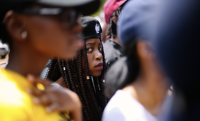 What is a person? It's a threshold question, as if it could only be asked in the passage between an end and a beginning, at a moment when the list of the virtues of human existence is exhausted, dries up, and we finally see that what we thought was properly human is, after all, shared with other beings. In its tendency to move away from purist differentiations governed by exclusive properties, science not only fails to offer this guarantee, but has contributed to shattering the logic of unity, of restriction, of what is, in short, singular.
What is a person? It's a threshold question, as if it could only be asked in the passage between an end and a beginning, at a moment when the list of the virtues of human existence is exhausted, dries up, and we finally see that what we thought was properly human is, after all, shared with other beings. In its tendency to move away from purist differentiations governed by exclusive properties, science not only fails to offer this guarantee, but has contributed to shattering the logic of unity, of restriction, of what is, in short, singular.
Body
19.04.2025 | by Marta Rema
 Stuart Hall’s ironic use of “the west and the rest” is very real in the fixation among South Africans with “us” and “Africa”. It was encouraging that a sense of South Africa’s inextricable connectedness to the rest of the continent surfaced at moments in the FMF struggle. But the curiosity about and interest in African politics, literature, and academic knowledge still hasn’t really taken off, whether among students or established scholars.
Stuart Hall’s ironic use of “the west and the rest” is very real in the fixation among South Africans with “us” and “Africa”. It was encouraging that a sense of South Africa’s inextricable connectedness to the rest of the continent surfaced at moments in the FMF struggle. But the curiosity about and interest in African politics, literature, and academic knowledge still hasn’t really taken off, whether among students or established scholars.
Face to face
30.05.2022 | by Sean Jacobs
 The long history of advocacy around “women’s rights are human rights” features activists from the Global South and women of color in the US. For instance, in 1945, at the founding of the United Nations, Latin American feminists played a critical role in trying to advance “women’s rights” into the category of human rights. And after World War II, when the US Black freedom movement often deployed human rights arguments, Pauli Murray, the attorney, feminist, and civil rights advocate, argued specifically that “women’s rights are a part of human rights.” What changed at the end of the 20th century was that a far-reaching and expanding global feminist movement began to collectively use the idea that “women’s rights are human rights” to advocate for change at the United Nations and beyond.
The long history of advocacy around “women’s rights are human rights” features activists from the Global South and women of color in the US. For instance, in 1945, at the founding of the United Nations, Latin American feminists played a critical role in trying to advance “women’s rights” into the category of human rights. And after World War II, when the US Black freedom movement often deployed human rights arguments, Pauli Murray, the attorney, feminist, and civil rights advocate, argued specifically that “women’s rights are a part of human rights.” What changed at the end of the 20th century was that a far-reaching and expanding global feminist movement began to collectively use the idea that “women’s rights are human rights” to advocate for change at the United Nations and beyond.
Body
08.10.2021 | by Lisa Levenstein
 This article demonstrates that antifeminist agendas (often labelled as anti-gender ideology by proponents) are key to understand how ethnonationalist, xenophobic and racist discourses are forwarded by far-right parties in Portugal and across Europe. Therefore, it focuses on the intersections between antifeminism, including femonationalism, and anti-immigration agendas, examining how gendered and racialized tropes are used in conjunction in far-right propaganda.
This article demonstrates that antifeminist agendas (often labelled as anti-gender ideology by proponents) are key to understand how ethnonationalist, xenophobic and racist discourses are forwarded by far-right parties in Portugal and across Europe. Therefore, it focuses on the intersections between antifeminism, including femonationalism, and anti-immigration agendas, examining how gendered and racialized tropes are used in conjunction in far-right propaganda.
To read
19.05.2021 | by Rita Santos and Sílvia Roque
 We have a lot in common, much more than “having shared the same kind of love”. In what concerns the rights of women, we have an oppression and social injustice past and present in common. We are both oppressed in the sense that we don’t have the power of decision over our own bodies; we cannot decide whether to get out of an exploitative relationship or not because society, family, church, culture, traditions will tell you that you need to put up with it and stop “rebelling”.
We have a lot in common, much more than “having shared the same kind of love”. In what concerns the rights of women, we have an oppression and social injustice past and present in common. We are both oppressed in the sense that we don’t have the power of decision over our own bodies; we cannot decide whether to get out of an exploitative relationship or not because society, family, church, culture, traditions will tell you that you need to put up with it and stop “rebelling”.
Body
04.12.2018 | by Leopoldina Fekayamãle
 For the most part, prevailing definitions of gender in African studies have come from disciplines located within the Western body of knowledge. Scholars are often unaware how much these definitions are steeped in the mores and norms of the Judeo-Christian tradition, and the social conventions of European and European American cultures.
For the most part, prevailing definitions of gender in African studies have come from disciplines located within the Western body of knowledge. Scholars are often unaware how much these definitions are steeped in the mores and norms of the Judeo-Christian tradition, and the social conventions of European and European American cultures.
To read
01.11.2011 | by Nkiru Nzegwu
 What is a person? It's a threshold question, as if it could only be asked in the passage between an end and a beginning, at a moment when the list of the virtues of human existence is exhausted, dries up, and we finally see that what we thought was properly human is, after all, shared with other beings. In its tendency to move away from purist differentiations governed by exclusive properties, science not only fails to offer this guarantee, but has contributed to shattering the logic of unity, of restriction, of what is, in short, singular.
What is a person? It's a threshold question, as if it could only be asked in the passage between an end and a beginning, at a moment when the list of the virtues of human existence is exhausted, dries up, and we finally see that what we thought was properly human is, after all, shared with other beings. In its tendency to move away from purist differentiations governed by exclusive properties, science not only fails to offer this guarantee, but has contributed to shattering the logic of unity, of restriction, of what is, in short, singular.  Stuart Hall’s ironic use of “the west and the rest” is very real in the fixation among South Africans with “us” and “Africa”. It was encouraging that a sense of South Africa’s inextricable connectedness to the rest of the continent surfaced at moments in the FMF struggle. But the curiosity about and interest in African politics, literature, and academic knowledge still hasn’t really taken off, whether among students or established scholars.
Stuart Hall’s ironic use of “the west and the rest” is very real in the fixation among South Africans with “us” and “Africa”. It was encouraging that a sense of South Africa’s inextricable connectedness to the rest of the continent surfaced at moments in the FMF struggle. But the curiosity about and interest in African politics, literature, and academic knowledge still hasn’t really taken off, whether among students or established scholars.  The long history of advocacy around “women’s rights are human rights” features activists from the Global South and women of color in the US. For instance, in 1945, at the founding of the United Nations, Latin American feminists played a critical role in trying to advance “women’s rights” into the category of human rights. And after World War II, when the US Black freedom movement often deployed human rights arguments, Pauli Murray, the attorney, feminist, and civil rights advocate, argued specifically that “women’s rights are a part of human rights.” What changed at the end of the 20th century was that a far-reaching and expanding global feminist movement began to collectively use the idea that “women’s rights are human rights” to advocate for change at the United Nations and beyond.
The long history of advocacy around “women’s rights are human rights” features activists from the Global South and women of color in the US. For instance, in 1945, at the founding of the United Nations, Latin American feminists played a critical role in trying to advance “women’s rights” into the category of human rights. And after World War II, when the US Black freedom movement often deployed human rights arguments, Pauli Murray, the attorney, feminist, and civil rights advocate, argued specifically that “women’s rights are a part of human rights.” What changed at the end of the 20th century was that a far-reaching and expanding global feminist movement began to collectively use the idea that “women’s rights are human rights” to advocate for change at the United Nations and beyond.  This article demonstrates that antifeminist agendas (often labelled as anti-gender ideology by proponents) are key to understand how ethnonationalist, xenophobic and racist discourses are forwarded by far-right parties in Portugal and across Europe. Therefore, it focuses on the intersections between antifeminism, including femonationalism, and anti-immigration agendas, examining how gendered and racialized tropes are used in conjunction in far-right propaganda.
This article demonstrates that antifeminist agendas (often labelled as anti-gender ideology by proponents) are key to understand how ethnonationalist, xenophobic and racist discourses are forwarded by far-right parties in Portugal and across Europe. Therefore, it focuses on the intersections between antifeminism, including femonationalism, and anti-immigration agendas, examining how gendered and racialized tropes are used in conjunction in far-right propaganda.  We have a lot in common, much more than “having shared the same kind of love”. In what concerns the rights of women, we have an oppression and social injustice past and present in common. We are both oppressed in the sense that we don’t have the power of decision over our own bodies; we cannot decide whether to get out of an exploitative relationship or not because society, family, church, culture, traditions will tell you that you need to put up with it and stop “rebelling”.
We have a lot in common, much more than “having shared the same kind of love”. In what concerns the rights of women, we have an oppression and social injustice past and present in common. We are both oppressed in the sense that we don’t have the power of decision over our own bodies; we cannot decide whether to get out of an exploitative relationship or not because society, family, church, culture, traditions will tell you that you need to put up with it and stop “rebelling”.  For the most part, prevailing definitions of gender in African studies have come from disciplines located within the Western body of knowledge. Scholars are often unaware how much these definitions are steeped in the mores and norms of the Judeo-Christian tradition, and the social conventions of European and European American cultures.
For the most part, prevailing definitions of gender in African studies have come from disciplines located within the Western body of knowledge. Scholars are often unaware how much these definitions are steeped in the mores and norms of the Judeo-Christian tradition, and the social conventions of European and European American cultures. 